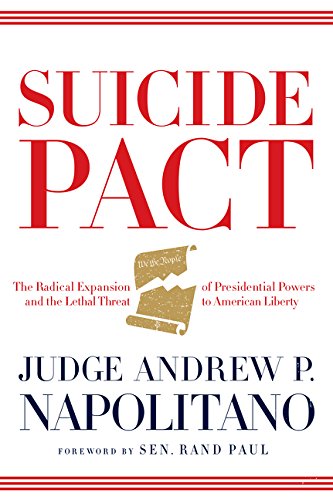We do not have the whole story yet about Trump’s payments to several women through his lawyer Michael Cohen. As Judge Napolitano points out, there may be other evidence (records, tapes, witnesses, memos, e-mails) that will come out. We have Trump’s rebuttal as presented in this news article.
However this plays out, it doesn’t affect Trump’s guilt or innocence. He’s innocent under the First Amendment. Trump could pay a hundred women off during an election season and still not be guilty of any crime. The crime is in campaign finance laws that are unconstitutional. They are fake laws, counterfeits, forgeries, shams. They are part of that vast superstructure of “laws” and “regulations” by which Congress has overridden the Constitution. It matters little whether this lengthy process was intended by the Framers, was a result of weaknesses in the document, or occurred as each new generation lost the meaning of the Revolution and adopted new sentiments. The effect is the same. We operate our politics in an “Alice in Wonderland” environment.
The First Amendment states “Congress shall make no law…abridging the freedom of speech…” This prohibition is libertarian in nature because speech is not physically aggressive. Exceptions are carved out by libertarian theory under the heading of lies that amount to fraud or such; but these do not alter the main thrust of the First Amendment, which is to prohibit the curtailing, restriction and censorship of free speech. Naturally, property-holders can determine speech on their property, but that too doesn’t alter the meaning of the First Amendment language.
 Suicide Pact: The Radi...
Best Price: $0.25
Buy New $2.84
(as of 04:15 UTC - Details)
The free speech right directly follows from and thus accompanies one’s right to one’s body, one’s life, one’s liberty and one’s pursuit of property and happiness. The First Amendment codifies that right.
Suicide Pact: The Radi...
Best Price: $0.25
Buy New $2.84
(as of 04:15 UTC - Details)
The free speech right directly follows from and thus accompanies one’s right to one’s body, one’s life, one’s liberty and one’s pursuit of property and happiness. The First Amendment codifies that right.
This right includes using one’s resources to communicate. If Congress restricts use of one’s property to create speech, that’s a backdoor or indirect way of abridging speech. That kind of restriction is also ruled out by the First Amendment, by any reasonable understanding. A law whose effect is to abridge the freedom of speech without making an explicit restriction is still abridging the freedom of speech.
The Supreme Court has upheld the First Amendment on many occasions. The Citizens United case in 2010, for example, “…struck down major laws and precedents that restricted independent expenditures in campaigns by corporations and unions.” For a supportive lawyer’s opinion published in 2014 in The New York Times, see here. Only “no limits on contributions or expenditures” are consistent with the First Amendment, the author argues.
 In this light, Trump’s alleged campaign finance violations lack substance and therefore merit. Whatever their status may eventually be determined to be by House Democrats or by the Senate or by public opinion or by the Supreme Court, campaign finance laws that restrict use of either one’s own property or property donated to one’s campaign, are not, under the First Amendment, constitutional.
In this light, Trump’s alleged campaign finance violations lack substance and therefore merit. Whatever their status may eventually be determined to be by House Democrats or by the Senate or by public opinion or by the Supreme Court, campaign finance laws that restrict use of either one’s own property or property donated to one’s campaign, are not, under the First Amendment, constitutional.
Campaign finance laws that restrict speech attempt to control information. Freedom of speech calls for an unrestricted flow of information and purported information. Elections under the First Amendment are speech free-for-alls. Congressional attempts by force of law to tame or control election speech violate the First Amendment.
Mueller has nothing of substance against Trump, even if Michael Cohen ties him hand and foot to payments of hush money, rightly or wrongly, accurately or inaccurately. Under the supreme law of the land, neither Cohen nor Trump did anything wrong or illegal in making payments to several women. Those campaign finance laws made by Congress pursuant to the Constitution are unconstitutional and invalid when they conflict with the First Amendment.






